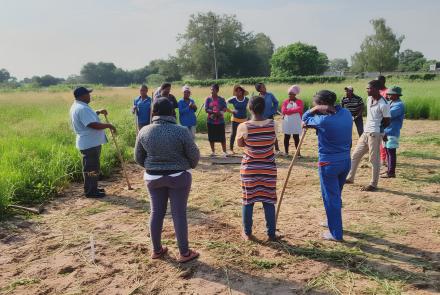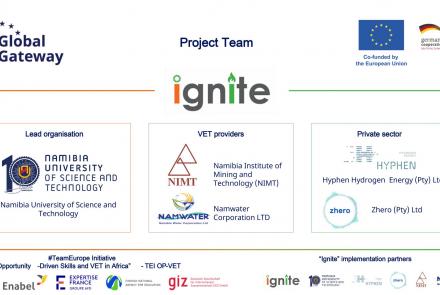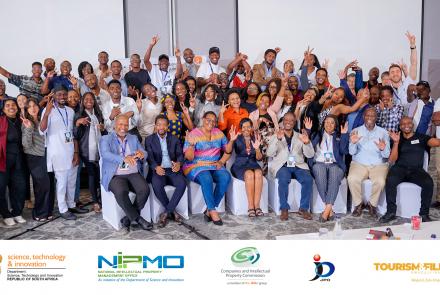Global Gathering at NUST
The month of August carried a sense of excitement as scholars, researchers, and professionals from across the globe gathered for the International Conference on Emerging Trends in Networks and Computer Communications (ETNCC). Hosted by the Namibia University of Science and Technology (NUST) through the UNESCO Chair on Secure High-Performance Computing and the Faculty of Computing and Informatics, the hybrid event took place from 5–7 August 2025.
With technical co-sponsorship from the IEEE South Africa Section, the three-day gathering set the stage for groundbreaking conversations on High-Performance Computing (HPC), Artificial Intelligence, Smart Communication, Big Data, and Cybersecurity.
Innovation with Purpose
“We are fostering in-depth discussions that push the boundaries of science and technology to deliver real-world impact,” remarked Prof. Erold Naomab, Vice-Chancellor of NUST, in his opening address. His words reflected the spirit of the conference: innovation with purpose.
Record Participation and Research Output
The scale of participation was remarkable. Over 300 delegates joined, representing academia, industry, and government. According to the Technical Programme Chair and UNESCO Chairholder, Prof. Dharm Singh Jat, ETNCC 2025 attracted 645 research paper submissions. After a rigorous double-blind peer-review process involving 447 reviewers, 249 papers were accepted, reflecting an acceptance rate of 38%. These contributions will be indexed in leading global research databases, including Web of Science and Scopus, amplifying NUST’s visibility on the international stage.
Exploring Digital Transformation
Over the course of the conference, 40 technical sessions, keynote addresses, and panel discussions unpacked the realities of digital transformation, the urgent need for cybersecurity, and the role of advanced computing in shaping a smarter, more resilient future. Beyond the technical programme, the event included the African Research Symposium, a research seminar, and a workshop on HPC that showcased the continent’s growing capacity in computational science.
Voices from the Conference
"Artificial Intelligence and Intelligent networks are no longer the future, they are here and the transformative value must lie in how they are deployed to improve life," stated Mr Gernot Piepmeyer, Secretary General of the Namibia National Commission for UNESCO.
"ETNCC is a platform for academic recognition, cross-border collaboration and for sparking ideas that will shape the future of technology," said Dr Simeon Hamukoshi, Strategic Project Coordinator at NCRST, on behalf of Prof Anicia Peters, CEO of NCRST.
Dr Udochukwu B. Akuru, Chair of the IEEE South Africa Section, highlighted the importance of Women in Engineering to empower women professionals. He also mentioned the funding opportunities provided by IEEE, motivating researchers to pursue further technical innovations.
"Technologies such as High-Performance Computing, Artificial Intelligence and secure communication are not only shaping business decisions but are also influencing National Development Goals and societal priorities," said Dr Licky Erastus, Managing Director of MTC.
Prof Cristina Stefan, Pro Vice-Chancellor for Research Innovation and Development at the University of Namibia, added: "Powering AI systems and enabling next generation networks, the HPC and advanced communication infrastructure drive our digital age."
Dr Happy Sithole, of the National Integrated Cyber-Infrastructure System (NICIS), CSIR, South Africa, highlighted the role of HPC infrastructure and data-intensive research in providing long-term data sovereignty.
Research Day Showcases NUST Talent
Day two saw the Faculty of Computing and Informatics Research Day integrated into the programme, providing a platform for students and staff to showcase their work. “Research must serve national priorities and inspire solutions for our communities,” emphasised Prof. Fungai Bhunu Shava, Acting Executive Dean. The day featured 71 oral presentations across five parallel sessions, along with a research seminar where 25 abstracts were presented by faculty members and postgraduate scholars.
Collaboration and Knowledge Exchange
“This conference is more than an academic exercise; it is a global platform for collaboration, knowledge exchange, and innovation that speaks directly to the challenges and opportunities of our time,” said Dr Lisho Mundia, Deputy Executive Director, Ministry of Education, Innovation, Youth, Sports, Arts and Culture (MEIYSAC).
Dr Tshiamo Motshegwa, African Open Science Platform: Director of the National Research Foundation, mentioned in his keynote talk: “Africa holds immense potential to drive science and technological innovation. There are no limits to what we can achieve as Africans when we work together. By fostering collaboration, investing in research, and nurturing talent, we can unlock this potential and shape solutions that transform our continent and contribute to the world.”





